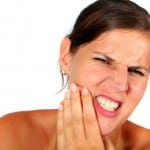 TMJ disorders affect the temporomandibular joint, which is situated just in front of your ear. This joint connects the mandible (the jawbone) to close to the temple on the skull. The TMJ is responsible for a number of movements including biting, yawning and opening and closing the mouth. TMJ disorders often cause jaw pain and restricted movements for the TMJ. Disorders associated with the TMJ can be known as TMJ dysfunction, TMJ pain or myofascial pain disorder.
TMJ disorders affect the temporomandibular joint, which is situated just in front of your ear. This joint connects the mandible (the jawbone) to close to the temple on the skull. The TMJ is responsible for a number of movements including biting, yawning and opening and closing the mouth. TMJ disorders often cause jaw pain and restricted movements for the TMJ. Disorders associated with the TMJ can be known as TMJ dysfunction, TMJ pain or myofascial pain disorder.
Problems with the TMJ are common, and an estimated 1 in 10 people will experience symptoms at some point in their lives.
The symptoms
Symptoms of TMJ disorders include:
- Headaches
- Pain when chewing food and biting down
- Locking of the jaw
- Restricted movement in the TMJ, causing difficulty when opening and closing the mouth
- Clicking of the jaw
- Problems with the ears, such as vertigo and increased sensitivity to noise
What causes problems with the TMJ?
Many different factors can cause problems with the TMJ, including over activity in the jaw. This may include clenching or grinding the teeth. Problems can also arise from damage to the joint as a result of arthritis or general wear and tear.
How to treat TMJ problems
If the TMJ disorder is caused by arthritis, you will be able to have the underlying cause treated. If your symptoms are caused by clenching and grinding, we advise that you wear a protective mouth guard during sleep. We can provide you with a custom-made mouth guard to prevent the occurrence of tooth grinding. In many cases, simply resting the jaw can ease the symptoms, along with taking pain relief medication.
Tags: Leeds Dentist TMJ, TMJ City of Leeds., TMJ Pain, TMJ treatment Central Leeds







